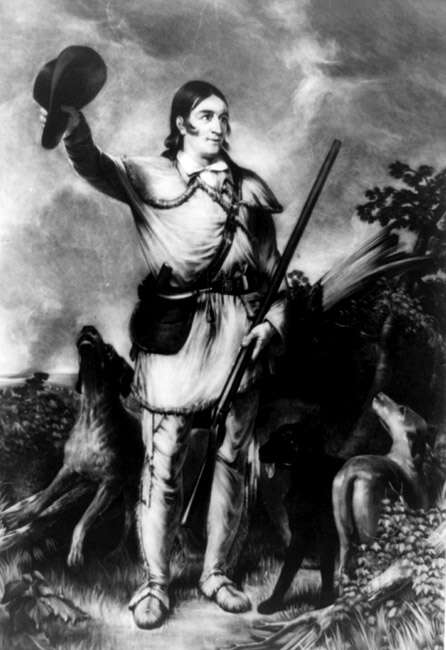The legendary frontiersman and congressman David "Davy" Crockett passed through Arkansas on his way from Tennessee to Texas in 1835. While at a Little Rock banquet given in his honor, he reportedly stated, "If I could rest anywhere it would be in Arkansas, where the men are of the real half-horse, half-alligator breed such as grow nowhere else on the face of the universal earth but just around the backbone of North America."
Davy Crockett was born in Greene County, Tenn., on Aug. 17, 1786. His parents were John and Rebecca Hawkins Crockett. He ran away from home at about age 13 and did not return home for some 30 months.
In 1806, Crockett married Mary "Polly" Finley, and they had three children, sons John Wesley and William and daughter Margaret. Polly Crockett died in 1815, and Crockett married Elizabeth Patton the following year.
Crockett supported his family primarily as a farmer and hunter. He enlisted as a volunteer in the Indian wars from 1813 to 1815 and saw action in Alabama and Florida. In the fall of 1816, he moved his family to what would become Lawrence County, Tenn. He served as justice of the peace and commissioner for the town of Lawrenceburg and rose to the rank of lieutenant colonel-commandant in the local militia. In 1821, he was elected to the Tennessee legislature, where he served two terms.
In 1827, Crockett was elected to the United States Congress from Tennessee, where he served from 1827 to 1831 and again from 1833 to 1835. His tenure in Congress was most noted by his opposition to the president, fellow Tennessean Andrew Jackson, on land reform issues and the Indian Removal bill. Crockett split politically with Jackson on a number of issues, including the sale of vacant (unowned) lands, which was a major concern of Crockett's constituents in western Tennessee. With the growth of Crockett's popularity, he was put forth by some members of the opposition Whig Party as a possible presidential candidate to oppose Martin Van Buren, Jackson's hand-picked successor, in 1836.
It was during this time that the legend of Davy Crockett began to grow. Crockett promoted himself as a simple but honest man who was an outstanding hunter and marksman. In 1834, he published an autobiography, "A Narrative of the Life of David Crockett of the State of Tennessee," which made him a popular figure nationally.
To derail Crockett's political plans, Jackson and William Carroll, governor of Tennessee, engineered Crockett's defeat in his bid for re-election to the Congress in 1835. Crockett was defeated by 252 votes. Hoping to revive his political career in Texas, he left Tennessee for good in November 1835. He and his party were well received during a stop in Little Rock. After leaving Little Rock, Crockett was toasted and celebrated for several days while in Washington in Hempstead County. He then continued the journey to Texas, with numerous unconfirmed exploits along the way adding to the Crockett legend.
While Crockett's travel through Arkansas is well documented, it is perhaps a letter from Isaac Jones, a resident of Lost Prairie in Miller County, to Crockett's widow, Elizabeth, after his death, that gives the best evidence of his visit. In the letter, Jones wrote: "Last winter, Colonel Crockett ... passed through Lost Prairie, on the Red River, where I live ... the Colonel visited me the next day, and spent the day with me. He observed, whilst here, that his funds were getting short, and proposed to me to exchange watches. He priced his at thirty dollars more than mine, which sum I paid to him, and we accordingly exchanged ... I was gratified at the exchange, as it gave me a keepsake which would remind me of an honest man, a good citizen, and a pioneer in the cause of liberty ... the object of this letter is to beg that you will accept the watch which accompanies it ... please accept, dear madam, for yourself and your family." Many historians speculate that Crockett's wife and family likely learned of his March 6, 1836, death through this correspondence.
Once in Texas, Crockett and his men joined Col. William B. Travis in the fight for Texas independence. Crockett was killed by the Mexican army during the final day of the Battle of the Alamo, adding a final chapter to his colorful life.
One of Crockett's grandsons, Robert Crockett, became the first mayor of Stuttgart after the town incorporated in 1889. The village of Crockett's Bluff in Arkansas County was named after William Finley Crockett, one of Davy Crockett's sons. -- Jeff Bailey with Len Pitcock
This story is adapted by Guy Lancaster from the online Encyclopedia of Arkansas, a project of the Central Arkansas Library System. Visit the site at encyclopediaofarkansas.net.
 This engraving of Davy Crockett is by C. Stuart, from an original portrait by J. G. Chapman; circa 1839. In 1835, on his way to Texas, former congressman and famous frontiersman Crockett made a stop in Little Rock (Pulaski County), where he was wined and dined by the locals. (Courtesy of Library of Congress Prints and Photographs Division)
This engraving of Davy Crockett is by C. Stuart, from an original portrait by J. G. Chapman; circa 1839. In 1835, on his way to Texas, former congressman and famous frontiersman Crockett made a stop in Little Rock (Pulaski County), where he was wined and dined by the locals. (Courtesy of Library of Congress Prints and Photographs Division)
